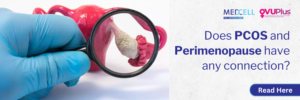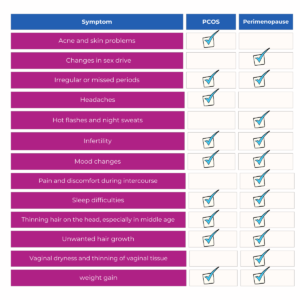What is the relation between PCOS and Perimenopause?
The relationship between Polycystic Ovary Syndrome (PCOS) and perimenopause is a complex one, as both involve hormonal changes and can impact a woman’s reproductive and overall health.
Here are the symptoms of the two conditions include:
Polycystic Ovary Syndrome (PCOS) is a common hormonal disorder that affects women of reproductive age. It is characterized by cysts on the ovaries, irregular periods, high levels of androgens (male hormones) and insulin resistance. This hormonal imbalance can lead to various symptoms and health challenges, affecting not only the reproductive system but also overall well-being and Perimenopause, is referred to as the “menopausal transition” the phase in a woman’s life that occurs leading up to menopause. During perimenopause, a woman’s ovaries gradually produce less estrogen and progesterone, the two primary hormones that regulate the menstrual cycle and fertility.
Early Signs of PCOS: Early detection of PCOS is important for timely management and to prevent health complications. Some of the early signs and symptoms of PCOS include:
- Irregular Menstrual Cycles: One of the hallmark signs of PCOS is irregular menstrual periods. This might manifest as infrequent periods, prolonged periods, or even missed periods.
- Excessive Hair Growth: Due to increased androgen levels, women with PCOS might notice increased hair growth on the face, chest, back or other areas where males typically grow hair.
- Acne and Oily Skin: Hormonal imbalances can lead to excessive sebum (oil) production, resulting in acne and oily skin.
- Weight Gain: Women with PCOS experience weight gain, particularly around the abdomen, due to insulin resistance and hormonal fluctuations.
- Hair Thinning or Hair Loss: Women with PCOS might experience hair thinning on the scalp, similar to male-pattern baldness.
- Mood Swings and Depression: Hormonal fluctuations can impact mood regulation and contribute to mood swings and emotional challenges.
- Difficulty Getting Pregnant: PCOS can affect fertility by disrupting ovulation, making it more challenging for women to conceive. Women may have larger ovaries. There may be a large number of immature egg follicles that develop around the ovary’s edge.
Source link
_____________________________________
OVU Plus is a gynaecology product for the treatment of female infertility caused due to PCOS.
Clinically Proven in:
- Polycystic Ovary Syndrome
- Excessive acne
- Hirsutism
Category Segment: For PCOS treatment
Therapeutic class: For PCOS management



